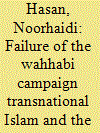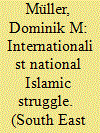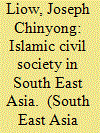| Srl | Item |
| 1 |
ID:
101348


|
|
|
|
|
| Publication |
2010.
|
| Summary/Abstract |
The Salafi madrasa has evolved in Indonesia as a consequence of Saudi Arabia's immensely ambitious global campaign for the Wahhabization of the Muslim umma. Demonstrating the importance of transnational networks in shaping the current dynamics of Indonesian Islam, the madrasa appears to be the centre of excellence for the Salafi protagonists to spread Saudi-style Wahhabi Islam among Indonesian Muslims at the grass-roots level. Its curriculum places an emphasis on the teaching of tawhid, or more precisely, Wahhabite doctrine. Meaning to accept and believe in the oneness of God and His absolute authority, tawhid is considered by the Salafis to be the pillar of the Muslim creed, whereby a superior moral order is established at the level of the individual, the family or the community. Because of its exclusive style and old-fashioned structure, it has attracted only a few abangan children, and thus has not brought about significant change. There is scepticism about the relentless effort of the Salafi teachers to recruit young villagers into their circles and introduce what they claim to be authentic Islam while criticizing local religious practices. Nonetheless, the impact of the madrasa has gone beyond the sphere of education. It has provided alternative access to education for underprivileged rural children and the downtrodden young and has offered a universal alternative model of truth and social action. Attempts to adjust the madrasa profile to the local context and national demands have been made by some Salafi protagonists in response to the geostrategic shifts and as a result of growing suspicion since 9/11 of the existence of the madrasa as a major training ground for terrorists.
|
|
|
|
|
|
|
|
|
|
|
|
|
|
|
|
| 2 |
ID:
101351


|
|
|
|
|
| Publication |
2010.
|
| Summary/Abstract |
Localized constructions of transnational Islamic kinship or 'brothers abroad' are an integral part of discursive practices within the community of the Islamic Party of Malaysia (PAS). Based on empirical data gained from anthropological fieldwork between 2009 and 2010, this article examines domestic manifestations and the implicit subtexts of the party's foreign policy, with particular regard to the Palestinian cause. Narratives of victimization and heroism are thereby as important as demonizing projections of delinquency and evil, while at times images of local and external enemies melt together. Furthermore, it is shown that PAS's Islamist internationalism is essentially (g)local, whereas national and ummahist identities are referred to only selectively.
|
|
|
|
|
|
|
|
|
|
|
|
|
|
|
|
| 3 |
ID:
101346


|
|
|
| 4 |
ID:
101349


|
|
|
|
|
| Publication |
2010.
|
| Summary/Abstract |
The Tablighi Jama'at ranks as one of the biggest missionary movements in the contemporary Muslim world and it has spread its network of itinerant members right across Asia. This paper looks at the spread of the Tablighi Jama'at in and across South East Asia in particular, tracing its early arrival in the 1950s to the present. The author identifies it as one of the many currents of globalization that has brought the region closer together in a borderless world that is now being integrated by the forces of capital. Interestingly, the Tabligh is one example of an alternative form of globalization that is faith-driven, and yet spreads across national political boundaries with relative ease. Understanding the Tablighi Jama'at, plus what motivates its members to opt for an alternative understanding and praxis of normative Islam in an age of mass consumerism and global capital, is one of the aims of this paper.
|
|
|
|
|
|
|
|
|
|
|
|
|
|
|
|
| 5 |
ID:
101350


|
|
|
|
|
| Publication |
2010.
|
| Summary/Abstract |
This paper explores the regional network of the Indonesian chapter of Hizbut Tahrir (HT), a transnational Islamic group aiming to revive the Islamic Caliphate. Focusing on the chapter of HT in Indonesia, the paper highlights how Hizbut Tahrir Indonesia (HTI) supports the activities of other HT chapters in the region and beyond. The key argument of the paper is that an understanding of HTI's transnational activism brings new insights to the current understanding of HT as a transnational movement. The author seeks to show the linkages between HTI and other HT chapters around the world and to analyse the implications of HTI's transnational activism.
|
|
|
|
|
|
|
|
|
|
|
|
|
|
|
|
| 6 |
ID:
101347


|
|
|
|
|
| Publication |
2010.
|
| Summary/Abstract |
This article examines the extent to which the Malaysian Islamic Party (PAS) and the Prosperous Justice Party (PKS) are becoming more moderate in their strategy and ideology. The author contends that both parties are struggling over the extent to which they should moderate in response both to strategic incentives present in the Malaysian and Indonesian political systems and to the political learning process whereby both parties are coming to understand the preferences of voters in their respective political systems. This process is complicated by divisions in the parties between pragmatists who would postpone controversial goals to reach out to non-devout voters, and purists who prioritize ideological authenticity.
|
|
|
|
|
|
|
|
|
|
|
|
|
|
|
|